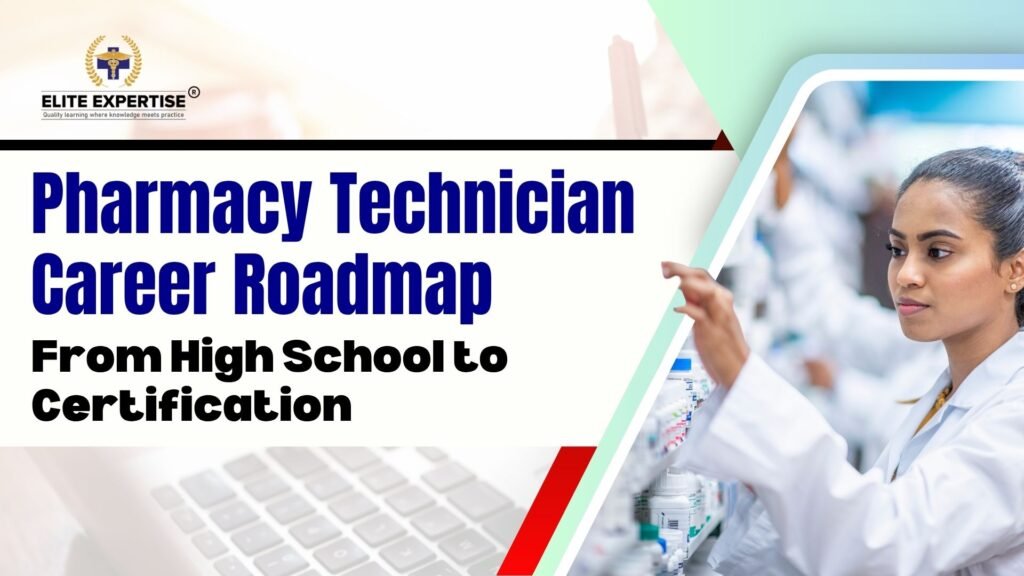Key Takeaways
- Start with a high school diploma or the equivalent.
- Get admission in an validated program for pharmacy technician programs
- Understand core pharmacy technician requirements
- Take the steps to get certified and licensed for career progression.
- Elite Expertise: One on one discussion from the experts.
Pharmacy Technician Career Roadmap: From High School to Certification
For the students who need to make their career as a pharmacy technician, the following is a comprehensive stepwise guide that focuses solely on Elite Expertise resources. The pharmacy technician process is organized, there are specific benchmarks and ultimately, the potential to enter a popular role in hospital or retail or specialty pharmacies.
Stepwise Training Path
- Step 1: High School Preparation
- A high school diploma or GED
- Biology, chemistry and math.
- Strong oral and written communication abilities.
- Step 2: Get Admission in a Pharmacy Tech Training Programs
- Select for a program that is accredited, online or offline
- The duration of the program is from 6–24 months
- Subjects include: pharmacology, labelling, state/federal regulations and ethics of a retail pharmacy technician calculation equipment service to customers
- Externship possibilities For practical experience, most programs offer externships
- Step 3: The Requirements for a Pharmacy Technician must meet
- Pass background checks and drug screening
- Complete state/regional registration forms
- Some roles require CPR or first aid certification
- Step 4: Certification and Licensure
- PEBC (Canada),[7] PTCE/ExCPT (US), OPRA (Australia and New Zealand). Some certification programs may require some practical experience.
- PEBC route: Document Review, Evaluating Exam (140 MCQs), Qualifying Exam (MCQ and OSCE)
- Check specific provincial or state regulatory authority requirements
- Step 5: Get ahead in your respective career
- A Seek employment in retail, hospital and specialty pharmacies.
- Research other options for remote and flexible employment
- Further studies For pharmacist assistant or pharmacist occupation
| Step | Action | Duration |
| 1 | High School Diploma | 4 years |
| 2 | Accredited Program | 6–24 months |
| 3 | Certification Exam | 1–3 months |
| 4 | Registration | 1–2 months |
| 5 | Career Growth | Ongoing |
The Career Graph Growth for Pharmacy Technician
- Lateral moves into specialty pharmacy, compound medicine, or hospital roles
- Up-skill with additional certifications for higher pay
- Pathway to become a pharmacist, clinical coordinator, or educator
Pharmacy Technician Training Programs
- Look for programs with externships and live support
- Elite Expertise offers real-pharmacist instructors, live sessions, recordings, and mock exams to maximize your exam scores
- Short upskilling modules available for continued growth
Conclusion
The journey to becoming a pharmacy technician is a structured, challenging and rewarding course from high school graduate to certified licensed professional. The field is growing in practice areas, and now there are more experience requirements for continuing education. Career progression pathway in health systems offers clear promotion routes, which cause job satisfaction and retention of employees. Various opportunities for pharmacy techs exist in retail, hospital and specialty pharmacies, with the ability to progress into supervisory or clinical support roles.
If you are ready to begin your pharmacy technician career in an expert way, start preparing honestly and with complete dedication for the training, certification, and professional success. All the expert guidance, information about the courses offering can given over various portals online as well as offline.
Frequently Asked Questions (FAQs) About Becoming a Pharmacy Technician
You need a high school diploma, completion of an accredited training program, certification, and a background check to become a pharmacy technician.
It typically takes between 6 to 24 months, depending on the program and whether you study full-time or part-time.
Certifications such as PEBC, PTCE, or other regional certificates are required to qualify as a licensed pharmacy technician.
The PEBC exam involves three main steps: document evaluation, the Evaluating Exam, and the Qualifying Exam.
After certification, you can work in hospitals, community pharmacies, specialty clinics, or remote pharmaceutical roles.
Yes, many reputable institutions offer online pharmacy technician programs that are flexible and accessible from anywhere.
Yes, pharmacy technicians can progress to higher-paying roles, pursue further education, or specialize in advanced pharmaceutical fields.
Elite Expertise provides expert-led preparation, live training sessions, and personalized support throughout your pharmacy technician journey.
Entry-level pharmacy technicians earn hourly wages that increase with experience, certifications, and skill development.
Key skills include communication, attention to detail, knowledge of medications, organization, and professional ethics.
